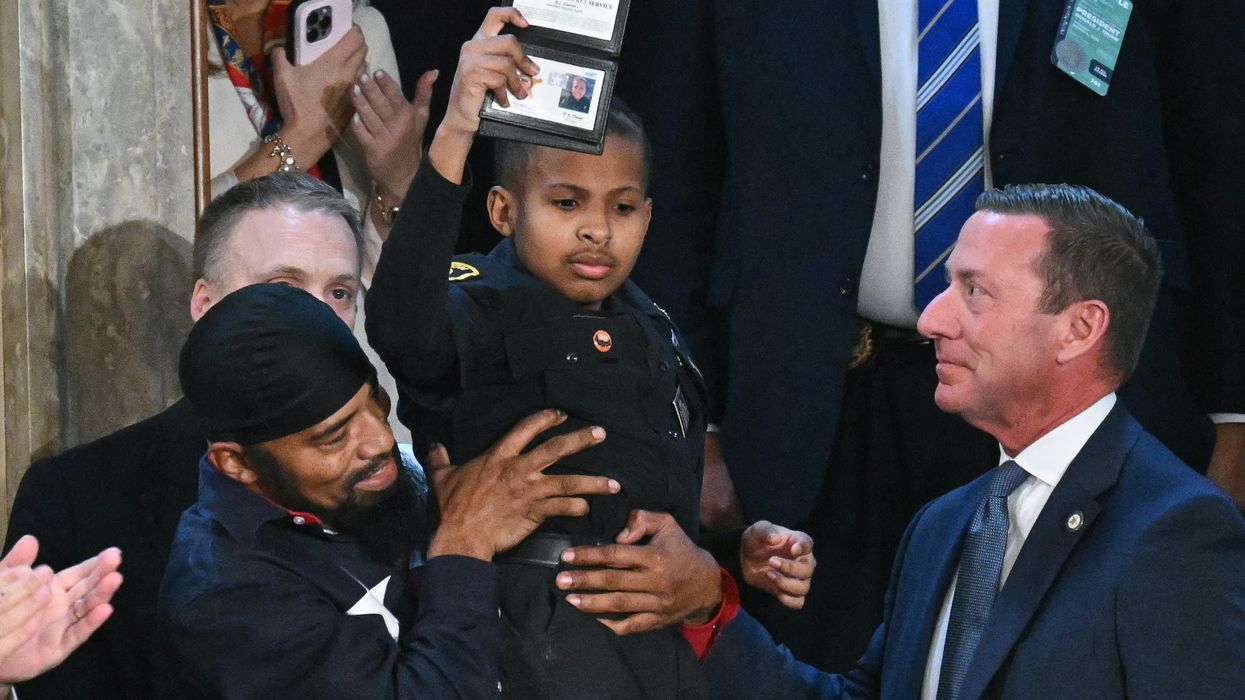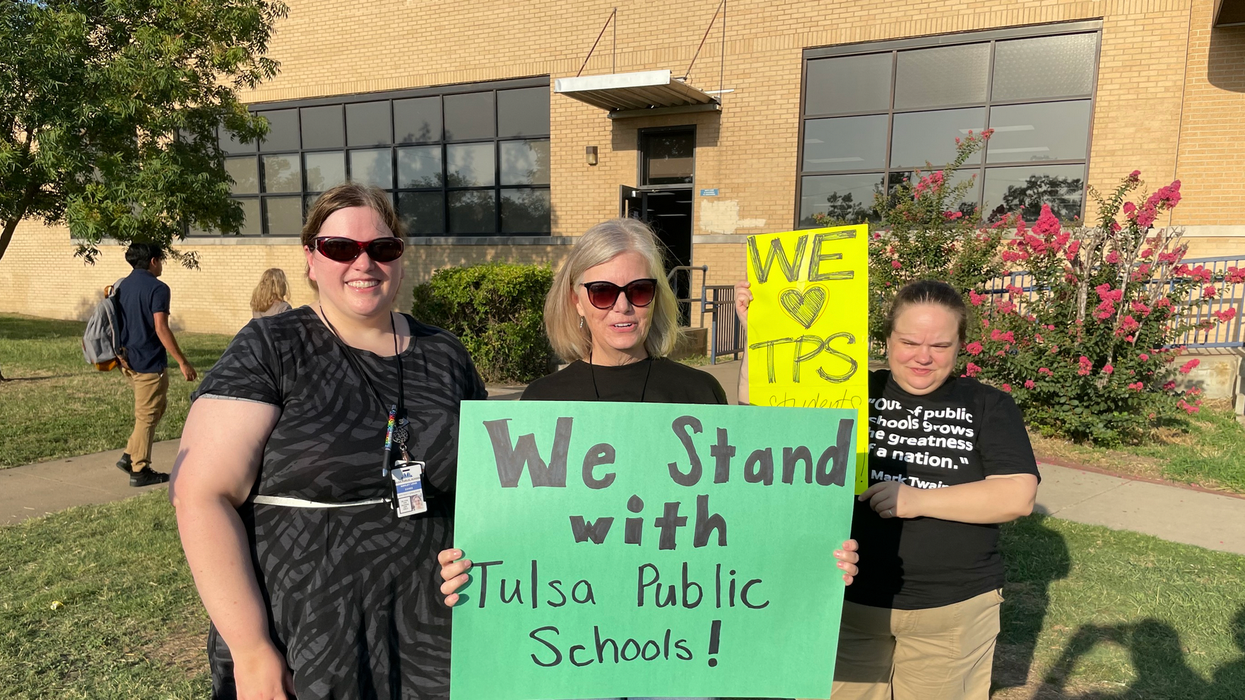If Trump Really Wants to Honor Cancer Survivors, He Should Stop Gutting Regulations
When Donald Trump says his administration is going to rid the environment of toxins, you can bet that the exact opposite is going to happen.
There was at least one heartwarming moment during President Donald Trump’s long-winded speech to Congress on March 4. Just before he announced that his administration is going to prioritize reducing childhood cancer (a plan that I debunked last week), Trump introduced Devarjaye “DJ” Daniel, a Black 13-year-old cancer survivor sitting with his father in the balcony. DJ, who dreams of becoming a police officer, was diagnosed with brain cancer in 2018 and given only five months to live. Since then, he has undergone 13 brain surgeries.
“A young man who truly loves our police,” said Trump. “…DJ has been sworn in as an honorary law-enforcement officer actually a number of times.” Trump then took DJ by complete surprise by making him an honorary member of the U.S. Secret Service.
On its face, it was a magnanimous gesture. One could only feel for DJ, who has gone through so much. A closer look, however, reveals that the tribute Trump paid to DJ masks at least two hypocritical realities.
Just how serious is Trump about getting toxins out of the environment? If his first administration is any indication, not at all.
First—and most obvious—Trump betrayed the police officers who defended the U.S. Capitol on January 6, 2021. As soon as he was sworn in on January 20 he pardoned or commuted the sentences of nearly all of the 1,600 convicted insurrectionists who violently stormed the U.S. Capitol, including hundreds who were guilty of assaulting police. He also ordered the Justice Department to dismiss all pending cases.
Second, Trump’s new Environmental Protection Agency (EPA) administrator just closed the agency’s environmental justice offices, wants to slash its budget by at least 65%, and has targeted more than two dozen rules and policies for elimination, putting people like DJ at greater risk.
Houston Area Residents Are Exposed to Multiple Carcinogens
How did DJ get cancer? “DJ’s doctors believe DJ’s cancer likely came from a chemical he was exposed to when he was younger,” Trump explained. He then linked DJ’s plight to the increase in childhood cancer rates over the last 50 years and pledged to make reversing that trend “one of the top priorities” of his administration’s “make America healthy again” initiative. “Our goal is to get toxins out of our environment,” he said, “poisons out of our food supply, and keep our children healthy and strong.”
If so, the Trump administration could start with cleaning up DJ’s home town of Houston, which ranks sixth on the list of the top 10 U.S. hotspots with the worst fine-particle air pollution, according to a March 2023 analysis by The Guardian. Like the other nine places on the list, Houston metro neighborhoods with a high percentage of Black and Latino residents have the most contaminated air because they are “fenceline communities” next door to polluting facilities. As one of the researchers who conducted the analysis told The Guardian, “What we’re seeing here is segregation. You have segregation of people and segregation of pollution.”
DJ lives in Pearland, a suburb that sits on the border of Harris and Brazoria counties, 14 miles south of downtown Houston. Although Pearland is not a fenceline community, it is only 10 to 20 miles from some of the dirtiest petrochemical plants in the metro area, and air pollution does not stop at political boundaries.
Based on federal data from 2011 to 2015, The Guardian analysis did not identify the companies most responsible for Houston’s foul air, but subsequent studies based on more recent data did.
Ten Houston-area facilities wound up on a list of the top 100 worst air polluters in the country compiled in 2020 by the Environmental Integrity Project (EIP), a Washington, D.C.-based nonprofit. Using 2018 data from the EPA’s Toxic Release Inventory, EIP’s report weighted pollutants based on how hazardous they are when inhaled and calculated that only 10 Houston area facilities were responsible for nearly 38% of the 288 million tons of “toxicity-weighted” air pollution the 410 petrochemical facilities in the metro area emitted.
Five of those 10 facilities, including Dixie Chemical, ExxonMobil Chemical, ExxonMobil’s Baytown Refinery, and LyondellBasell Channelview, are located in Harris County. Two others, INEOS USA Chocolate Bayou Works chemical plant and Dow Chemical—at 7,000 acres the largest chemical manufacturing facility in the Western hemisphere—are in Brazoria County. Pearland is only 10 miles from Pasadena, where Dixie Chemical is located; 22 miles from Baytown, home to the two ExxonMobil facilities; and 18 miles from Channelview, home to LyondellBasell’s 4,000-acre chemical manufacturing complex.
EIP tracked the top three chemicals each of the 10 facilities released. It found that the seven plants in Brazoria and Harris counties collectively emit at least five that cause cancer in humans—1.3 butadiene, benzene, formaldehyde, ethylene oxide, and nickel—and another four that are “probable” human carcinogens, including cobalt and naphthalene. LyondellBasell Channelview is the biggest source for ethylene oxide, which poses one of the metro area’s highest health risks.
More recently, a July 2024 report by Air Alliance Houston identified the top “dirty dozen” air polluters in the area based on 2018 to 2022 data from the EPA’s Toxic Release Inventory and the Texas Commission on Environmental Quality. The 12 facilities include three cited in the EIP report—Dixie Chemical, ExxonMobil’s Baytown complex (including the refinery and chemical plant), and LyondellBasell Channelview—and nine others, including Calpine’s Deer Park Energy Center, Chevron Phillips Baytown, and Shell Deer Park Chemical. Deer Park, in Harris County, is only 14 miles from Pearland.
Like EIP, Air Alliance Houston found that the majority of the worst polluters are located near low-income and Black and Latino neighborhoods, causing health problems ranging from respiratory irritation in the short term to cancer over the long term.
The Trump Administration Wants to Destroy the EPA
Just how serious is Trump about getting toxins out of the environment? If his first administration is any indication, not at all.
Just after he was elected president in 2016, Trump gave The New York Times his first on-the-record news media interview and proclaimed that “clean air is vitally important” and “crystal clean water is vitally important.” By the time he left office, his administration had rolled back or eliminated nearly 100 environmental safeguards.
This time around, Trump has wasted no time undermining the government’s ability to protect the public from environmental hazards. Back in 2017, Trump proposed cutting the EPA budget by 31%. Last month, his new EPA administrator, Lee Zeldin, said he wants to cut the budget by at least 65%, which would severely cripple the agency.
Over the past 20 years, 82% of oil and gas industry donations and 90% of coal industry donations went to Republicans, so well before Trump first ran for office, the party has functioned as an arm of the fossil fuel industry.
Just last week, Zeldin announced his agency will kill 31 key environmental safeguards. “Today is the greatest day of deregulation our nation has seen,” he said in a statement on March 12. “We are driving a dagger straight into the heart of the climate change religion to drive down cost of living for American families, unleash American energy, bring auto jobs back to the U.S., and more.”
Three former EPA administrators—William K. Reilly, who served under George H.W. Bush; Christine Todd Whitman, who served under George W. Bush; and Gina McCarthy, who served under Barack Obama—warned that Zeldin’s plan would endanger the lives of millions of Americans. Dismantling longstanding regulations would be a “catastrophe,” said Reilly, “and represents the abandonment of a long history” of EPA actions protecting public health and the environment.
That same day Zeldin issued his “historic” announcement, it was reported that he is also planning to eliminate EPA offices responsible for addressing the disproportionately high levels of pollution in minority and low-income communities as a part of Trump’s war on diversity, equity, and inclusion (DEI). An internal EPA memo obtained by a number of news outlets revealed that Zeldin is going to shut down all of the agency’s Environmental Justice Divisions at its 10 regional offices “immediately.” Zeldin already closed the agency’s Office of Environmental Justice and External Civil Rights in Washington, D.C., which was established in 1992 during the George H.W. Bush administration.
In the memo, dated March 11, Zeldin said closing the environmental justice offices is in part a response to a Trump executive order calling for “ending radical and wasteful government DEI programs and preferences.” When CBS News asked him to elaborate, Zeldin said in a statement: “President Trump was elected with a mandate from the American people. Part of this mandate includes the elimination of forced discrimination programs.” Never mind that Black, Brown, and low-income communities suffer the most discrimination, environmental and otherwise.
A Government for Sale
Why are Trump and the Republican Party so intent on weakening and eliminating health and environmental protections? Follow the money. Over the past 20 years, 82% of oil and gas industry donations and 90% of coal industry donations went to Republicans, so well before Trump first ran for office, the party has functioned as an arm of the fossil fuel industry.
Last April, Trump promised roughly two dozen oil executives at a private meeting at his Mar-a-Lago resort that he would roll back Biden-era environmental rules if they donated $1 billion to his presidential campaign. Although the attendees, who included officials from Chevron, Continental Resources, ExxonMobil, and Occidental Petroleum, did not honor Trump’s request, fossil fuel interests poured $96 million directly into Trump’s campaign coffers during the 2023-24 election cycle, according to an analysis by the environmental group Climate Power. Meanwhile, 83% of the oil and gas industry’s contributions to congressional candidates—$15.7 million—went to Republicans, according to Open Secrets.
The oil and gas industry also dug deep to help pay for Trump’s inaugural bash. His inaugural committee received $2 million from Chevron, $1 million from ExxonMobil, and $1 million from Occidental Petroleum.
So when Donald Trump says his administration is going to rid the environment of toxins, you can bet that the exact opposite is going to happen. More kids like DJ Daniel—as well as more adults—in Houston and other highly polluted places will suffer from respiratory diseases, cancer, and other serious health problems. It’s no wonder why the Republican Party’s nickname, GOP, now stands for Gas and Oil Party.
This column was originally posted on Money Trail, a new Substack site co-founded by Elliott Negin.


